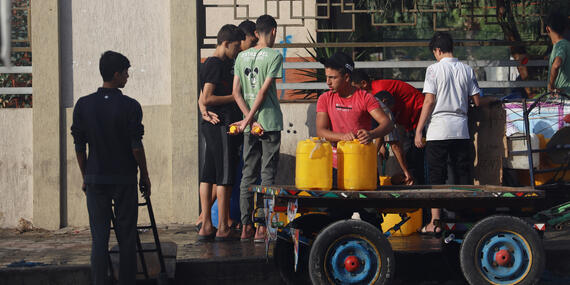Today's top news: Occupied Palestinian Territory, Sudan, Democratic Republic of the Congo, Niger, Somalia

Occupied Palestinian Territory
OCHA warns that the situation is increasingly dire for hundreds of thousands of Palestinians in Gaza City and other areas in the north of Gaza, as armed clashes and intense bombardment continue.
As of yesterday, no bakeries were active in the north due to the lack of fuel, water and wheat flour, as well as sustained damages. Food security partners have been unable to deliver assistance in the north for the past seven days.
Hospitals in the north of Gaza sheltering tens of thousands of displaced people continue to experience attacks in close proximity to their facilities. The World Health Organization (WHO) says that due to a lack of medical supplies, doctors are having to conduct complex surgeries, including amputations, without anesthesia.
Aid continues to enter Gaza from Egypt. Yesterday, 81 trucks carrying food, medicine, health supplies, bottled water and hygiene products crossed, bringing the total number of trucks that have entered Gaza since 21 October to 650.
However, OCHA warns that the daily volume of humanitarian assistance entering from Egypt meets just a fraction of people’s needs. Drinking water brought in serves just 4 per cent of Gaza’s residents, while desperately needed fuel remains banned.
Yesterday, a convoy of five trucks from the UN Relief and Works Agency for Palestine Refugees in the Near East and WHO – escorted by two vehicles from the International Committee of the Red Cross – came under fire on their way to deliver life-saving medical supplies to the Shifa and Al Quds hospitals in Gaza City. Two trucks were damaged, and one driver was injured. The convoy ultimately reached Shifa hospital, where it delivered the medical supplies.
Sudan
The Sudanese Armed Forces and the Rapid Support Forces adopted a Statement of Commitments in Jeddah yesterday to protect civilians and provide unimpeded humanitarian access in Sudan.
The Humanitarian Coordinator in Sudan, Clementine Nkweta-Salami, called it a moment of truth for the country. She said all parties must provide reliable guarantees that relief items, humanitarian workers and assets can move safely across conflict lines.
To facilitate the implementation of these commitments, OCHA will lead a new Humanitarian Forum for Sudan, with the participation of the parties to the conflict.
After almost seven months of war, half of Sudan’s population – nearly 25 million people – needs humanitarian assistance. Less than one fifth of these people have been reached, mainly due to insecurity and access constraints.
Democratic Republic of the Congo
The UN Famine Prevention and Response Coordinator, Reena Ghelani, is on a four-day mission to the Democratic Republic of the Congo to discuss food security.
Ms. Ghelani is meeting authorities, diplomats and aid partners on exploring options to tackle the root causes of food insecurity, mobilizing resources and advocating for innovative interventions to prevent famine.
She said the country needs support to transform how it produces food agriculturally to eradicate poverty and hunger, which affects a staggering 25.4 million people – nearly 25 per cent of the population. More than 7.5 million of these people live in the conflict-hit eastern and western parts of the country.
Niger
OCHA reports that despite challenges and limited resources, national and international aid organizations in Niger continue to deliver assistance across the country.
Since the beginning of the year, more than 2 million people have received humanitarian aid.
Before the political crisis, 4.3 million people required assistance, including 3.3 million facing food insecurity and 700,000 displaced people. Poor harvests, floods, growing insecurity and the impact of the political crisis have led to the further deterioration of the humanitarian situation. The number of people who need aid has increased to 4.7 million.
The US$584 million Humanitarian Response Plan for Niger is currently 43 per cent funded.
Somalia
OCHA reports that heavy rains and flooding have now affected nearly 1.2 million people in Somalia, with nearly 335,000 people displaced from their homes.
Humanitarian partners report that at least 28 people, including eight children, have died. The situation is particularly serious in South-West State, where nearly half a million people have been affected, roads are flooded, and shelters for scores of internally displaced people have been destroyed.
Following a request by the Deputy Prime Minister, UN agencies have quickly sourced maritime equipment that is now being used by local responders to evacuate 2,400 people who were trapped by floods in Jubaland.
UN agencies, partners and the authorities are deploying urgent humanitarian assistance – including food, water and shelter – to flood-affected areas using available ground and air assets. Already, more than 63,000 people are receiving cash assistance, 88,000 are getting hygiene kits and more than 80,000 will soon receive clean water.
More torrential rain is expected in the coming days, which is likely to damage more roads and inundate air strips, hindering the delivery of life-saving humanitarian assistance, especially in southern Somalia.
